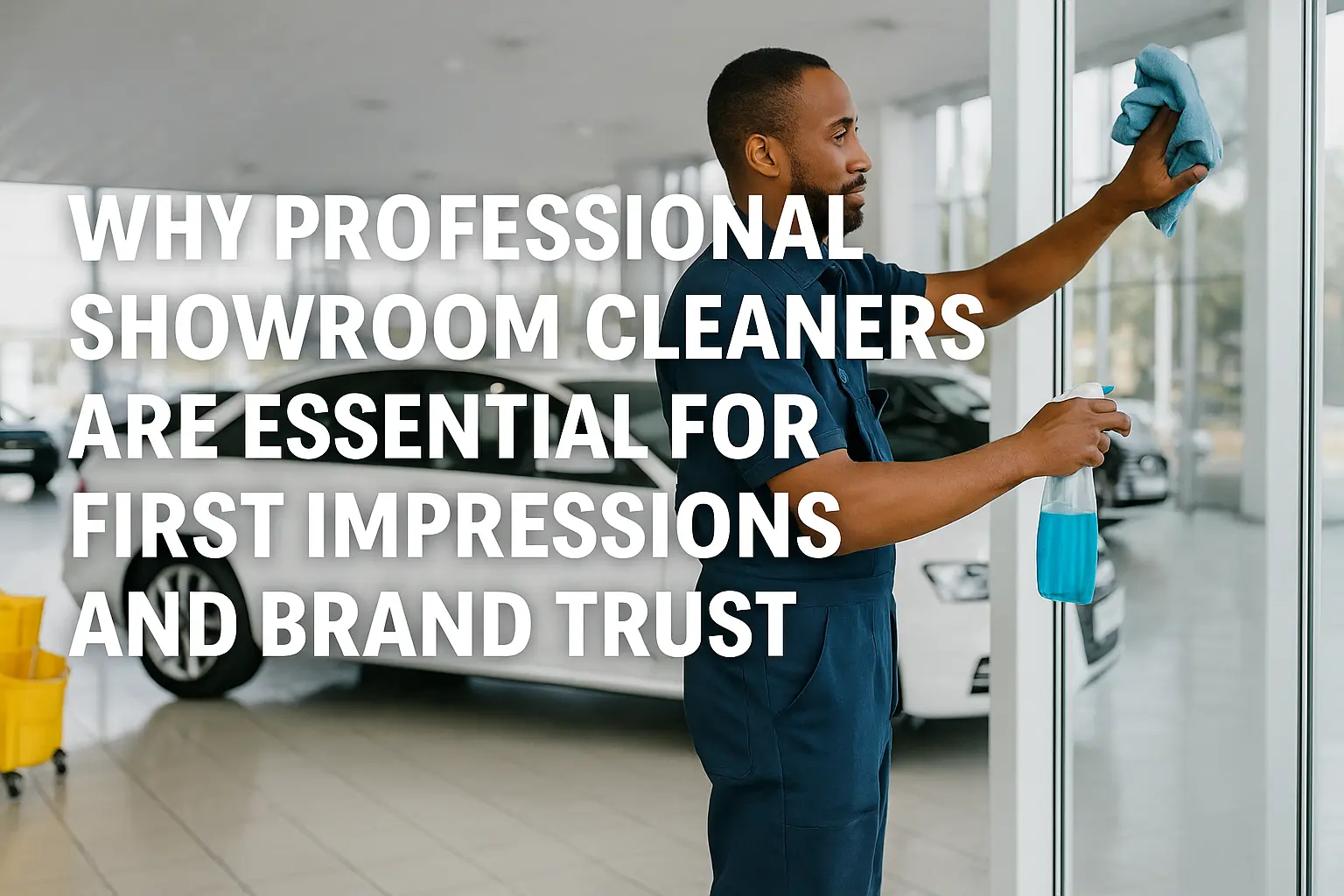Think back to the last time you walked into a showroom—maybe a sleek car dealership, a luxury fashion boutique, or even a high-tech electronics gallery. Before you looked at the product, your brain had already started making judgments. Was the air fresh? Were the floors spotless? Did the space feel premium? These subtle cues often decide whether you feel confident in the brand. What many customers don’t realize is that the people responsible for that silent storytelling are not designers or marketers, but professional cleaners. They transform everyday spaces into experiences that build trust and loyalty.
Importance of Professional Showroom Cleaners

1. The Psychology of Trust in Spotless Spaces
People don’t consciously think, “This store is clean, so I’ll buy.” Instead, their brains associate order and hygiene with safety and credibility. It’s the same reason people choose restaurants with spotless kitchens. A jewelry showroom with crystal-clear glass cases reassures buyers that the gems inside are cared for with the same precision. This psychological link is powerful, and brands that invest in professional cleaning benefit from trust that can’t be built through sales talk alone.
2. When Cleanliness Speaks Louder Than Marketing
A brand can spend thousands on glossy billboards, but if a potential buyer walks into a dusty showroom, the message collapses. Cleanliness is often the first “unpaid advertisement” customers encounter. Imagine visiting two rival car dealerships: one where the cars shine under spotless lights and another where coffee stains linger on the floor tiles. Which brand feels more trustworthy? In that moment, the cleaner showroom doesn’t just look better—it feels more reliable. Professional cleaners make sure marketing promises are matched by reality.
3. Showrooms as Stages, Cleaners as Stage Managers
A showroom is much like a theater. The products are the actors, the sales team are the narrators, but the stage itself—the floors, the lighting, the displays—needs to be flawless. Professional cleaners play the role of stage managers. They ensure that when the curtain rises (or in this case, when the doors open), everything is ready for a seamless performance. For example, a luxury furniture store may have velvet sofas and glass tables on display; one fingerprint or speck of dust ruins the illusion of luxury. Cleaners protect that illusion so the “actors” shine.
4. Consistency Builds More Than Loyalty—it Builds Memory
One powerful but often overlooked aspect of trust is consistency. Think about a customer who visits a showroom three times before making a big purchase, like a new car. If every visit feels equally polished—no dust, no clutter—that experience becomes imprinted in memory. When they recall the brand later, they don’t just remember the car model; they remember how the showroom felt. Professional cleaners provide that invisible thread of consistency, making sure each encounter feels equally premium, which cements the brand in the customer’s mind.
5. Protecting the Products That Sell the Story
Showrooms don’t just house products—they showcase investments worth thousands, sometimes millions. Whether it’s an electric car with a delicate paint finish or a glass sculpture in a design store, improper cleaning risks damaging the very items meant to inspire desire. Professional cleaners are trained not just to “clean,” but to preserve. For instance, they know how to buff a showroom floor without dulling it or polish chrome without scratches. This technical expertise ensures that every product continues to tell the story of quality that customers expect.
6. Cleanliness as a Competitive Edge
In cities where multiple showrooms compete for attention, the cleanest one often feels like the safest bet. A spotless environment doesn’t just attract customers; it keeps them. Think of an electronics store—two shops offer the same gadgets, but in one the shelves are dusty and cables are tangled, while in the other everything gleams and feels organized. Shoppers naturally gravitate toward the second, not because the gadgets are different, but because the environment signals reliability. Cleaners give brands this subtle but decisive edge.
7. The Ripple Effect on Employees and Service
Trust is not just built between customers and brands; it also grows inside the team. Employees working in a tidy, polished showroom carry themselves differently. They feel proud, confident, and more willing to go the extra mile. For example, a salesperson in a spotless showroom can focus fully on explaining features instead of worrying about cleaning smudges before a demo. Professional cleaners indirectly elevate customer service by giving staff an environment that inspires professionalism.
8. The Role of Clean Showrooms in Customer Storytelling
Every showroom tells a story. Whether it’s a car dealership showcasing innovation or a furniture store highlighting comfort, cleanliness is the canvas on which that story is painted. If the canvas is smudged, the story feels incomplete. For example, a showroom promoting eco-friendly furniture loses credibility if dust collects on the very products meant to symbolize freshness and sustainability. Professional cleaners help brands tell a consistent, believable story by ensuring the space itself reflects the values being marketed.
9. Clean Showrooms Encourage Longer Stays
Time spent in a showroom is often linked to purchase likelihood. Customers who feel comfortable tend to explore more options and spend more money. Imagine a family visiting a home décor showroom—if the environment feels fresh and welcoming, they’re more likely to browse room by room, even discussing future purchases they hadn’t planned on. On the flip side, an unpleasant smell or dusty corner can make them cut their visit short. Professional cleaning creates an inviting atmosphere that encourages customers to linger—and lingering often leads to buying.
10. Hygiene Standards as a Modern Expectation
In the post-pandemic era, customers are more conscious than ever about hygiene. They expect businesses to maintain high cleaning standards, especially in public spaces. A luxury electronics showroom that advertises cutting-edge technology but leaves smudges on demo tablets instantly loses credibility. Professional cleaners ensure these gaps don’t exist. They sanitize touchpoints, maintain air quality, and show customers that the brand respects their health. In industries where health awareness is now tied to trust, this level of detail is non-negotiable.
11. A Long-Term Investment, Not Just a Daily Task
Some businesses see cleaning as a background chore, but in reality, it’s an investment with long-term returns. Consistently polished spaces prevent wear and tear, reduce repair costs, and protect valuable fixtures. For instance, marble floors in luxury showrooms require specialized care—without it, scratches can permanently dull their shine. Professional cleaners use the right techniques to preserve these materials, saving brands from expensive replacements. Beyond cost, the consistency reassures customers that the brand isn’t just focused on short-term sales but on maintaining lasting excellence.
Conclusion
Behind every polished car hood, shining jewelry display, or spotless furniture showcase lies the unseen effort of professional cleaners. They don’t just remove dirt; they build impressions, reinforce promises, and nurture trust. In industries where customers make decisions based on how they feel as much as what they see, professional showroom cleaners become silent architects of reputation. A showroom can only earn trust if every detail supports it—and that begins with a clean stage.
































































